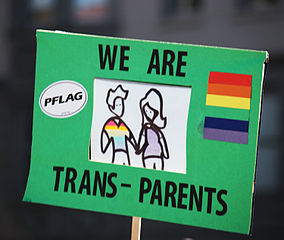America in Transition

Schools and other organizations revise their policies to protect and include transgender individuals.
 Sign at Washington DC Pride Parade 2012 Related Links
|
On May 2, 2015, the Board of Trustees at Smith College, a women's college in Northampton, Massachusetts, voted to clarify the inclusion of self-identified transgender women in their undergraduate admission policy. Smith College President Kathleen McCartney said in her announcement: "The policy decision is the culmination of a year of formal study, during which the board and an appointed Admission Policy Study Group reviewed Smith's admission policy in light of society's evolving understanding of gender." This decision by Smith College was one of many examples of schools and other organizations adapting to the needs of transgender individuals in the United States.
Various Organizations Make a Stand
In 2011, after a transgender girl wasn't initially allowed to join the Girl Scouts of Colorado, the organization released a statement that "Girl Scouts is an inclusive organization and we accept all girls in Kindergarten through 12th grade as members. If a child identifies as a girl and the child's family presents her as a girl, Girls Scouts of Colorado welcomes her as a Girl Scout."
That same year, the North American Gay Amateur Athletic Alliance revised its policy to include bisexual and transgender players. In 2012, the Episcopal Church made changes to their nondiscrimination rules to include gender identity.
No More Gender Identity Disorder
In 2013, a major change came with the fifth edition publication of the American Psychiatric Association's Diagnostic and Statistical Manual of Mental Disorders. In the edition, "gender identity disorder," a term that had been considered by many to be stigmatizing, was replaced with "gender dysphoria," a term that refers to only those who feel anxious about their gender identity.
In 2012, the Equal Employment Opportunity Commission (EEOC) ruled that the Civil Rights Act of 1964, Title VII, prohibits gender identity-based employment discrimination. The EEOC released this statement, "discrimination against a transgender individual because that person is transgender is, by definition, discrimination based on sex and such discrimination violates Title VII."
The ruling paved the way for transgender employees to file harassment claims with the EEOC. The following year, for the first time ever, the EEOC ruled in favor of a transgender woman who was physically and verbally harassed while working with a federal contractor in Maryland.
More Changes in Education and Schools
In 2011, California passed the FAIR Education Act, which required the inclusion of transgender individuals' political, economic, and social contributions in the state's textbooks and social studies classes. Two years later, California passed the first law in the U.S. that protects transgender students. The law, named the School Success and Opportunity Act, states that every K-12 student who attends public school in the state must be "permitted to participate in sex-segregated school programs and activities, including athletic teams and competitions, and use the facilities consistent with his or her gender identity, irrespective of the gender listed on the pupil's records."
In 2014, the U.S. Department of Education released guidelines informing public schools across the country to make sure that transgender students are allowed to attend single-sex classes that are consistent with their gender identity. Therefore, a student who identifies as a transgender girl would be a part of a girls-only class, a transgender boy would be in a boys-only class.
Mills College in Oakland, California, became the first U.S. single-sex college to pass a policy admitting openly transgender individuals. Adopted in 2014, the new policy stated that applicants who self-identify as female were welcome. That same year, Mount Holyoke in South Hadley, Massachusetts, became the first Seven Sisters college to accept transgender students.
2015 and Beyond
The changes kept coming in 2015. The Army issued a new rule that transgender soldiers could not be dismissed by mid-level officers. The discharge decision must be made by top civilian personnel. Also in 2015, a U.S. federal court ruled that the Affordable Care Act prohibits discrimination against transgender individuals by a federally-supported health care provider.
More changes are still needed to protect the rights of over 700,000 transgender individuals who live in the United States. As of May 2015, 32 states still have no laws banning job discrimination against transgender individuals. Furthermore, 45% of all transgender people between the age of 16 - 25 attempt suicide and, in the first five months of 2015, seven transgender women were murdered in the United States. The current rise of transgender issues into the national spotlight will hopefully bring about even more needed change and protection.
Source: The National Center for Transgender Equality, American Psychiatric Association's Diagnostic and Statistical Manual, U.S. Department of Education, Equal Employment Opportunity Commission, Williams Institute at UCLA's School of Law
—Jennie Wood
About the author







